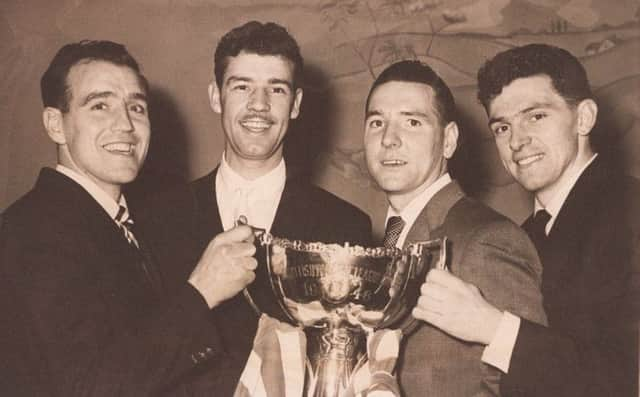Obituary: Sammy Wilson, footballer


With the death of Sammy Wilson at the age of 82, Celtic Football Club is mourning the last of one of its most famous XIs, the victors in the Scottish League Cup Final of 1957.
With the passing of Bobby Collins in January this year, Wilson had become the last surviving member of the team that famously beat Rangers 7-1 on 19 October, 1957. It was the club’s record score against their old rivals, and remains the highest score recorded in an English or Scottish cup final, though not, as is often reported, a British record, as higher winning scores were achieved in the early years of the Irish and Welsh Cups.
Advertisement
Hide AdAdvertisement
Hide AdWilson was the scorer of the first goal in that final, and, in all, he played 70 matches for the Parkhead club, scoring 46 goals, a remarkable return for a player who was not an out-and-out striker.
He was also instrumental in Celtic signing his fellow townsman Jimmy Johnstone, voted the club’s greatest-ever player, who would become Wilson’s friend for life.
Born into a family of nine in Uddingston, the small dormitory town in Lanarkshire not far from the East End of Glasgow, Wilson was educated at St John the Baptist Primary before moving to a brief secondary education before an apprenticeship as a car mechanic which would be a mainstay during his non-football life.
His youthful footballing talents took him to Renfrew Juniors, where he made his debut at just 17. Starting out as an industrious midfielder, he made an impact locally, so that Paisley club St Mirren, then managed by Bobby Rankin, swooped on their near neighbours to sign Wilson as a professional at 19.
In all he spent six years at Love Street, playing 52 competitive matches for the Buddies, and scoring ten goals. With the number of his first team games falling, he was released by manager Willie Reid in May, 1957.
Wilson was promptly signed by then Celtic manager Jimmy McGrory, primarily as cover for more established stars in a team that had largely under-achieved since winning the League and Cup double of 1954. But any side with the likes of Bobby Collins, Willie Fernie, Bertie Peacock and the irrepressible legend that was Charlie Tully was always going to be hard to break into.
McGrory gave Wilson his chance, however, particularly in the League Cup which at that time was played at the start of the season and was completed before the Scottish Cup got under way.
He made his debut for Celtic in the 4-1 League Cup win over East Fife on 14 August, 1957, playing at right half. The key moment in Wilson’s career came when McGrory – though some say it was the idea of dictatorial chairman Robert Kelly – switched him to playing at inside left alongside centre forward Billy McPhail. The two men struck up an immediate and fruitful partnership, and they were soon rattling in the goals as Celtic progressed to their second successive League Cup final, Wilson notching six goals in all.
Advertisement
Hide AdAdvertisement
Hide AdBy then, Wilson was employed part-time as a car mechanic, and came to an arrangement with his employer that he would work one in four Sundays so that he could get Saturday afternoons off to play for Celtic – a far cry from the modern player’s lot.
Fans used to seeing Old Firm finals as a matter of course in subsequent decades may be amazed to learn that it was the first time Celtic had played Rangers in the final of either major domestic trophy since 1928, albeit that the League Cup had only been going since season 1946-47.
Celtic were determined to defend the Cup they had won for the first time the previous year against Partick Thistle, and they attacked Rangers from the first whistle. They had already hit the crossbar and post when Wilson got his moment of glory after 22 minutes.
A cross into the Rangers penalty area was met by McPhail, who nodded the ball down to his striking partner, Wilson volleying past goalkeeper George Niven and full-backs Bobby Shearer and Eric Caldow on the line with a lovely right-foot shot. The floodgates opened, and Celtic rampaged to their most hallowed victory over Rangers.
Sadly for him, Wilson’s career at Celtic was effectively doomed the following year when McPhail suffered a serious injury that stopped him playing. By then he had made a massive contribution to Celtic’s future, acting on a local teacher’s recommendation and suggesting Jimmy Johnstone from Viewpark, Uddingston, as a youngster to be watched, which he duly was.
Celtic released Wilson on a free transfer and he went down south to Millwall to try his luck, scoring 11 goals in 23 games for them. Moves to Northampton Town and Mansfield Town followed before he returned to Scotland in 1961, playing for Ross County in the Highland League.
After finishing his career at Brora Rangers, Wilson stayed north coaching youngsters for Ross County and Brora and managing a number of local teams. He made his home in Invergordon and also became a talent-spotter for the professional clubs, with Brora’s Roddy MacDonald, who signed for Celtic, his best-known recommendation.
Wilson, who had no children, was predeceased by his wife but is survived by his sister Elizabeth. His funeral took place on 17 November at St John the Baptist’s Church in Uddingston, where he attended daily Mass until the day before he died.
Fittingly, it is the same church that hosted the funeral of his great friend Jimmy Johnstone in 2006.